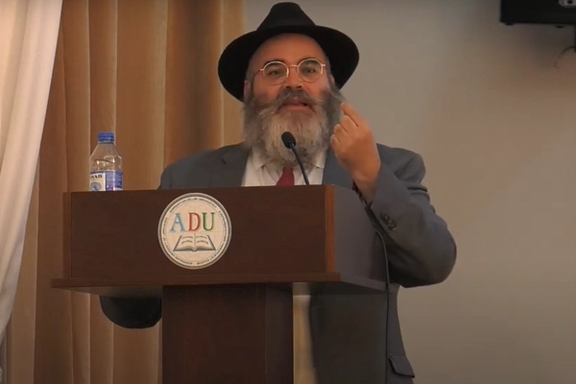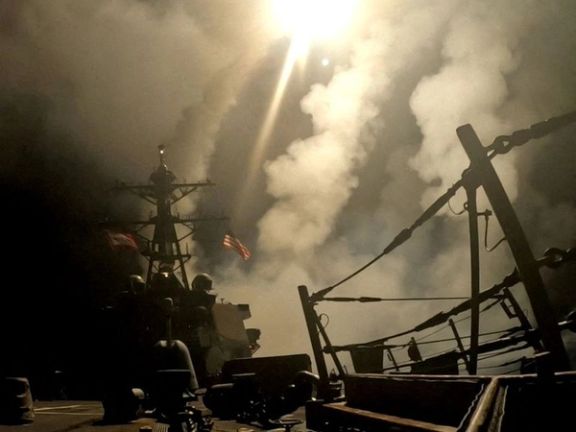Iran gives 14-month jail terms to film directors on propaganda charges

The directors of acclaimed Iranian film My Favorite Cake have each been sentenced to 14 months behind bars on charges of propaganda against the Islamic Republic.

The directors of acclaimed Iranian film My Favorite Cake have each been sentenced to 14 months behind bars on charges of propaganda against the Islamic Republic.
The Revolutionary Court also sentenced Behtash Sanaeeha and Maryam Moghaddam to one year of imprisonment on charges of “producing obscene content” and ordered the confiscation of all related equipment.
Both sentences will be suspended for five years, according to Iranian media outlets.
My Favorite Cake tells the story of an elderly woman living alone in Tehran, navigating the loneliness of old age while seeking new experiences. The film explores themes of personal freedom, love, and human connection.
Authorities have taken issue with the film’s portrayal of life outside state-imposed social restrictions, particularly its depiction of women without mandatory hijabs and scenes that hint at relationships outside conservative norms of unmarried couples.

The film also features scenes where the characters consume alcohol—an act that, while common in private homes, is illegal under Iran’s strict laws.
In Iran, the production, sale and consumption of alcohol have been prohibited since the 1979 Islamic Revolution. Despite the ban, alcohol consumption persists underground, with many Iranians producing homemade wine and spirits.
The film was awarded the FIPRESCI Jury Prize at Berlinale and the Silver Hugo at the Chicago Film Festival.
The film crew's trial comes amid an intensified crackdown on independent filmmakers and artists in Iran, particularly those who challenge state-imposed restrictions.

Iran warned regional states hosting US military forces that they could face retaliation if involved in a potential American attack, a senior Iranian official told Reuters.
The official, who spoke on condition of anonymity, added that Supreme Leader Ali Khamenei had placed Iran's armed forces on high alert.
Although US President Donald Trump has demanded direct negotiations, the official said Iran is open to a diplomatic path through intermediaries.
“Indirect talks offer a chance to evaluate Washington's seriousness about a political solution with Iran,” the official said. Talks via Oman could start soon if signals from the US align, though the official warned the path may be rocky.
Iran has issued formal warnings to Iraq, Kuwait, the UAE, Qatar, Bahrain and Turkey that allowing the US to use their airspace or territory during any attack would be treated as an act of hostility. Any such action “will have severe consequences for them,” the official said.
On Wednesday, Iranian state media reported that Kuwait had reassured Iran it would not permit aggression from its soil. Other governments approached by Reuters either declined to comment or did not respond. Turkey’s Foreign Ministry said it was unaware of any warning but suggested such messages could be delivered through alternative channels.
Meanwhile, Iran’s top military commander, Mohammad Bagheri, revealed the details of the Supreme Leader’s response to a letter sent by Trump on March 7.
“Negotiation directly is not acceptable, but indirect negotiation is not a problem,” Khamenei said in the message, according to Bagheri, the Chief of Staff of Iran's Armed Forces.
“You were the most disloyal and untrustworthy party in past negotiations, and thus there is no trust in you. However, we are not closing the door. If you act sincerely, negotiations can happen.”
According to Bagheri, Khamenei also told Trump that Iran is not pursuing a nuclear weapon. “We will respond with all our strength to any threats, but we are not warlike and will not start a war.”
Trump has warned Iran would be bombed if it did not agree to a new nuclear deal, prompting Khamenei to say on Monday that the Islamic Republic would deal a "strong blow" in retaliation for any attack.
Iran has also threatened to target American interests in the region, including its strategic Diego Garcia naval base in the Indian Ocean if it is attacked by the US.
The threats to neighbouring countries have escalated over recent months. In October, in the wake of Iran's attack on Israel which led to a retaliatory Israeli strike, The Wall Street Journal reported at the time that countries given warnings included Jordan, the United Arab Emirates, Saudi Arabia and Qatar, all of which host US forces.
It has since led to a complicating of regional dynamics. "US defense officials acknowledged that some regional partners have told the Pentagon that they don’t want Israeli warplanes flying over their territories or US troops launching offensive operations from inside or over their airspace," the WSJ reported.
"The Arab countries have said the US forces are allowed to conduct self-defense operations, the officials said," it added.

Iran attempted to pay a Georgian drug trafficker $200,000 to assassinate a Jewish religious leader in Azerbaijan, according to security officials cited by The Washington Post.
The operation, coordinated by the Quds Force of Iran’s Islamic Revolutionary Guard Corps, is part of what officials described as Tehran’s growing use of criminal proxies for targeted killings abroad.
“The [Iranian] officer handed Aslanov a photo of a prominent Jewish figure in Azerbaijan and detailed instructions on how to kill him,” one official said. “Aslanov agreed to kill Rabbi Shneor Segal for a price tag of $200,000.”
According to the Western and Middle Eastern security officials, the plot—thwarted by Azerbaijan’s State Security Service in early January—also included plans to target an educational center.
Aslanov and a local accomplice were arrested and charged with conspiracy to carry out a terrorist act, as stated by the State Security Service and reported in local media at the time.
The officials said the operation was arranged by Mohammad Golkari, an Iranian national with longstanding ties to organized crime, who helped coordinate Aslanov’s meeting with Quds Force operatives in Iran. After receiving instructions and the target's photo, Aslanov returned to Baku and recruited Azerbaijani citizen Jeyhun Ismayilov to assist with surveillance.
It is not the first such Iranian attack to be foiled in Azerbaijan. In 2023, then Foreign Minister Eli Cohen said Iran was responsible for a foiled plot to attack the Israeli embassy in Azerbaijan.
“Tehran stands behind the attempt ... Iranian terror is a global threat, as we saw in the past few days in Azerbaijan in an attempted attack against the Israeli Embassy in Baku, as well as in recent months in Cyprus and Greece in attempted attacks against Israelis and Jews,” he said at the time, saying Iran had funded and issued instructions to the terror cell that attempted the attack.
In the year before the war began in October 2023, Israel's chief of Mossad, David Barnea, said 27 Iran-backed plots had been foiled in Europe, Africa, the Far East and South America.
But Iran-backed plots to kill Jews and Israelis abroad have ramped up since the Gaza war, dozens foiled globally, in addition to plots inside the Jewish state.
Last week, ahead of the passover holiday next week, Israel's National Security Council warned the Israeli public to remain vigilant when traveling abroad amid concerns that Iran, Hamas, Hezbollah and global Jihadist groups will continue to actively advance attacks against Jews and Israelis worldwide.
"With the collapse of the cease-fire and resumed fighting in Gaza, we are expecting to see an increase in attempted attacks against Israeli/Jewish targets abroad carried out by local initiatives or lone-wolf attackers," the Council said in a statement.
It named Iran as "the main instigator of global terrorism against Israeli and Jewish targets around the world, both directly and through its proxies."
Iran relies on criminal networks to carry out extraterritorial operations. Other plots linked to Iranian agents have been reported in Germany, Peru, and the United States, where two men were convicted last month of accepting payment to kill Iranian-American journalist Masih Alinejad.

Iran’s ultra-hardline Kayhan newspaper, managed by a representative of the Supreme Leader, has repeated weekend calls to assassinate US President Donald Trump to avenge the 2020 killing of IRGC commander Qassem Soleimani.
On Sunday, the daily expressed support for what it described as revenge for the drone strike in Iraq, ordered by Trump during his first time in office, just one day after a piece had warned "a few bullets are going to be fired into that empty skull of his".
"The shot hasn’t even been fired yet, and already a bunch of local lackeys and US bootlickers are totally freaking out,... since their skulls are as empty as Trump’s, they’ve gotten scared," the outlet wrote on Sunday.
Since the assassination, Trump and several of his aides were put on a hit list but the issue of Soleimani's killing had been somewhat dulled down in recent months amid Trump's renewed campaign of 'maximum pressure' and calls to make a fresh nuclear deal.
The column, presented as a fictional conversation, called advocates of nuclear talks with the US “America’s bootlickers”. Iran's Supreme Leader continues to refuse to engage in direct talks, but has warmed to the idea of using mediation in the wake of Trump's warning that if a new nuclear deal is not reached within two months, the US will bomb Iran.
The former head of the Parliament's National Security Committee reacted to the newspaper's piece on Saturday, criticizing it as inflammatory while the situation remains so volatile.
Heshmatollah Falahatpisheh wrote on X, “Iranians hate those who promote war and terrorism. If you had the courage for war, you would’ve gone to Lebanon. If you have an assassination plan, don’t attribute your recklessness to Iran.
“The nation pays the price for the extremists’ warmongering and terroristic bluffs. The government must disavow this destructive movement.”
Tabnak website also criticized the article, warning of its costs to a nation already suffering a social and economic crisis.
"A newspaper, which happens to be state-affiliated, is publicly promoting a slogan whose cost will ultimately be paid by the people. It seems that if these ultra-revolutionary individuals truly have the motivation to sacrifice for the country, there are plenty of real opportunities to demonstrate that sacrifice," it wrote.
The paper said assassinating Trump would be “a good thing and would bring joy to Palestinians” and armed groups.
The US continues to confront Iran's Houthi militia in Yemen in the Red Sea region amid the group's maritime blockade on commercial shipping.
Ordered by the Supreme Leader in 2023 as a means to target Israeli shipping in order to force a ceasefire in Gaza, the blockade has since affected global shipping, with Trump vowing to tackle the group head on.

The Yemeni information minister announced that 70 Iran-backed Houthis and members of the Revolutionary Guards (IRGC) were killed in a US airstrike on Tuesday, claims denied by the IRGC, which called it “false news”.
The IRGC affiliated Tasnim News Agency called the Saturday announcement by Muammar Al-Eryani "psychological warfare”. Al-Eryani is the minister of Yemen's official government, which is at war with the Houthis.
"It seems that this false news has been published in the context of psychological warfare and in order to push the region towards an all-out war, while officials and military commanders of the Islamic Republic of Iran have repeatedly announced that the Yemeni Ansarullah forces are fighting the US and Israel completely independently,” Tasnim wrote.
Al-Eryani said in a press statement that the attack targeted a point that was "used to plan terrorist attacks against commercial ships and tankers in the Red Sea, Bab al-Mandab, and the Gulf of Aden” amid the Houthis’ maritime blockade.
The Houthis maintain a narrative of victory when publicizing information on engagement with US military action.
A press statement this week said: "We are in an advanced position on the maritime front, and the American aircraft carrier 'Truman' is in a constant state of retreat, with pursuit ongoing,” the US vessel on the frontline of the maritime conflict.
The US has carried out multiple airstrikes across Houthi-controlled areas of Yemen since last month as it cracks down on the Iran-backed group which has been imposing the blockade since November 2023 in the wake of the Gaza war.
The group began the blockade targeting Israeli-linked ships, claiming to be working in allegiance with Hamas in Gaza but has since targeted multiple international vessels and killed international seamen.
US President Donald Trump has warned that any firing by the Houthis in Yemen will be directly attributed to the Islamic Republic of Iran and will have serious consequences for Tehran.
"From this moment on, every shot fired by the Houthis will be considered a shot fired by Iranian weapons and leadership. Iran will be held responsible, it will bear the consequences, and these consequences will be serious," he wrote in a message on his social media account, Truth Social.
In spite of denials from Tehran that they are controlling the group, Trump continues to attribute blame to Iran for funding and arming the group, the blockade initiated on the orders of Supreme Leader Ali Al Khamenei.
”Let no one be fooled! The hundreds of attacks carried out by the Houthis, these evil thugs and thugs based in Yemen who are hated by the Yemeni people, all originate from and are directed by Iran,” Trump said.
According to the Associated Press this week, satellite images show the deployment of at least six nuclear-capable B-2 Spirit bombers to Camp Thunder Bay on the island of Diego Garcia in the Indian Ocean, which is within striking distance of both Iran and Yemen.
Tensions also remain high between Iran and the US over Tehran’s rapidly advancing nuclear program.
The B-2 would be crucial in potentially bombing Iran’s underground nuclear sites and has been used in combat to target the Houthis in the past.

Iran’s President dismissed his deputy for parliamentary affairs on Saturday after images surfaced online showing the official on vacation in Argentina and en route to Antarctica during the Iranian new year holidays.
In a letter published by government-affiliated media outlets, President Masoud Pezeshkian wrote that the Antarctic vacation, “even if paid for personally,” could not be justified while “economic pressures remain severe and many in our country live in deprivation.”
Shahram Dabiri Oskuei has not commented publicly but shortly after the photos began circulating on March 25, the state-run IRNA news agency cited a member of his office denying the trip took place this year.
“The photo being shared is from past years,” the unnamed official said.
The controversy erupted after multiple images were posted on social media appearing to show Dabiri alongside a woman near a cruise ship and other landmarks in Buenos Aires.
Pezeshkian wrote that an internal review confirmed Dabiri had been on a recreational tour over the holiday.
However, the trip to Antarctica is not the VP's first controversial episode. In 2020, he was arrested on financial charges though in the end, the charges were dropped.
The holiday comes while one third of Iran is living below the poverty line in the worst economic crisis since the founding of the Islamic Republic, the average monthly income in Iran now as low as $200 for a family of four.